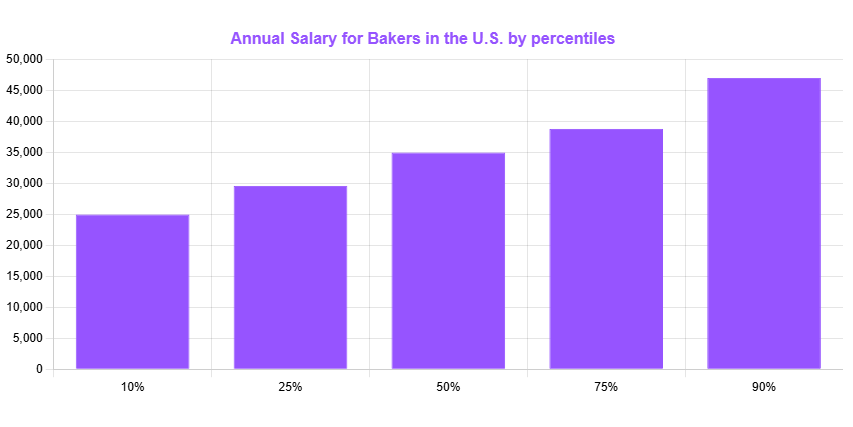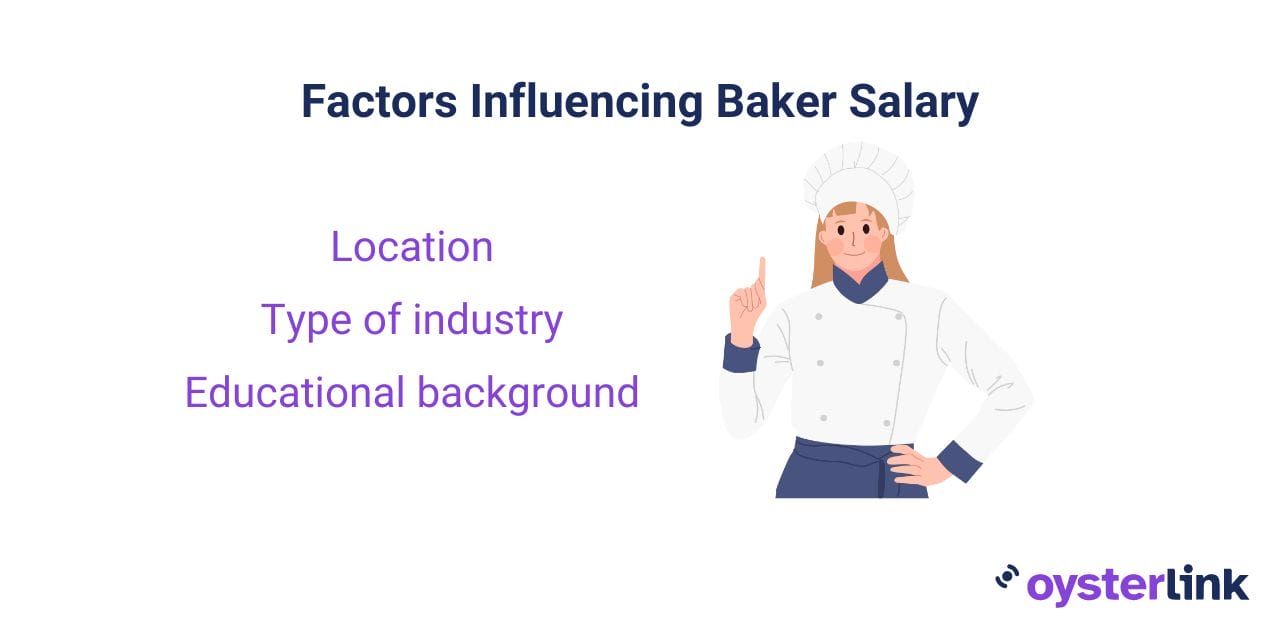Baker Salary in the United States
How Much Is the Average Baker Salary?
Bakers in the United States earn an average base salary of $35,550 per year or $2,963 per month, according to the Bureau of Labor Statistics (BLS).
Some Bakers receive only $24,960 a year (10th percentile), while others earn as much as $46,980 a year (90th percentile).

[Source: BLS]
If your salary is in the 10th percentile, this means you earn less than 90% of Bakers in the country. Meanwhile, if your earnings are in the 90th percentile, it means you earn more than 90% of your peers in the industry.
Bakers generally don't receive tips. However, some employers offer it as part of the employee benefits to increase the overall compensation package.
What Is the Hourly Wage for Bakers?
Bakers earn $17 per hour.
What Is the Weekly Wage for Bakers?
Bakers make $684 a week.
What Are the Factors That Influence a Baker's Salary?
Location, type of establishment and educational background can impact how much you can earn.
Location
Tourist destinations tend to offer higher salaries to restaurant and hospitality workers. Establishments in these places need highly skilled workers to provide excellent service for their guests.
For example, Hawaii, one of the most visited states by foreign travelers, offers Bakers $43,560 per year.
In contrast, Arkansas, while famous for its natural beauty but not typically considered a tourist destination, only pays Bakers an average of $27,940 per year.
Aside from Hawaii, the District of Columbia, Washington, Massachusetts and California also offer competitive salaries to Bakers.
The table below shows Baker salary in all 50 U.S. states and Washington, D.C.
Type of industry
Bakers working in the lodging industry, which includes bed and breakfasts, hotels and resorts, often enjoy higher salaries. BLS reports that professionals in this sector earn an average of $46,080 per year.
Upscale hotels offer slightly higher wages. In our list of Baker jobs in the United States, Hyatt Regency, a chain of luxury hotels, provides a salary range of $49,920 to $58,240 per year.
Educational background
Having certifications from culinary schools can also increase your earning potential. Employers recognize the value certified Bakers bring to their establishments, making them more likely to offer competitive salaries. Consider undergoing training for the following if you want to boost your pay:
- Viennoiserie
- Boulangerie
- Cake decorating
We found that these special skills are in demand for Baker roles in NYC.

How Much Is Your Take-Home Pay as a Baker?
We created state-specific calculators so you can compute your take-home pay after taxes regardless of where you work in the country. To use the calculator, start by choosing your state, pay frequency and salary.
Tips To Consider When Negotiating for a Higher Pay as a Baker
If you're asked about your salary expectations and your potential employer's answer doesn't quite meet your financial goals, there are ways to negotiate for a higher compensation:
- Highlight your years of experience: Employers are willing to offer higher pay to professionals who have a minimum of three years of experience. Those with a more extensive working background can be promoted to a supervisory role such as Head Baker. On top of the usual duties and responsibilities of a Baker, a Head Baker manages a team, ensures compliance with safety regulations and controls inventory.
- Emphasize special skills: Depending on the needs of the establishment you're applying to, highlight skills that are relevant to them. For example, if you're trying to negotiate your salary in a French bakery, emphasize how you worked as an apprentice at a boulangerie.
- Obtain a high school diploma or GED: While Bakers typically don't need a formal education, educational institutions that generally pay higher require a minimum of a high school diploma as educational background.
What Non-Monetary Benefits and Perks Do Bakers Get?
Here are the most common benefits offered to Bakers.
- 401(k) matching: This is when an employer matches the contribution you allot to your retirement account, helping you achieve your retirement savings goals faster.
- Paid time off (PTO): PTO allows you to take time off for sickness, vacation or other personal reasons without affecting your salary.
- Commuter benefits: These are employer-sponsored programs that include bus or train fares or subsidies for parking fees that help cover commuting costs.
- Life insurance: This is a payout provided to your family in the event of your death, helping them remain financially secure.
- Education and student loan programs: Many employers offer tuition reimbursement for training or courses that are relevant to the job. Make sure to take advantage of this, as it can help you increase your salary or advance your career in the long run.
Baker Salary Compared to Other Similar Positions
Bakers in the U.S. earn less than Pastry Chefs but more than Prep Cooks and Fast-Food Workers.
Baker Salary Data
Our data is calculated based on estimates from several job posting platforms. To know more about how we came up with our figures, visit our methodology page.
